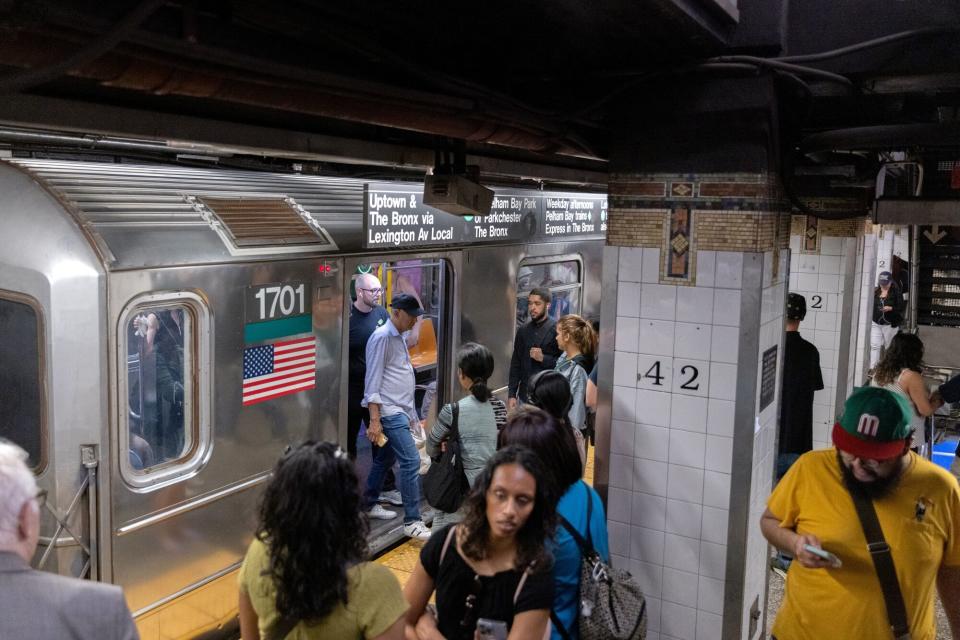NY’s MTA to Detail How Toll Pause Is Squeezing Operating Budget

(Bloomberg) -- New York City’s transit agency is warning of financial pressures to its operating budget after Governor Kathy Hochul’s paused a congestion pricing plan that would have directed billions to transit infrastructure.
Most Read from Bloomberg
YouTuber Dr Disrespect Was Allegedly Kicked Off Twitch for Messaging Minor
Nvidia Rout Takes Breather as Traders Scour Charts for Support
BuzzFeed Struggles to Sell Owner of Hit YouTube Show ‘Hot Ones’
Now the Metropolitan Transportation Authority needs to fill a $15 billion deficit in its multi-year capital program. If the $51.5 billion capital plan isn’t fully funded, the MTA must look to its operating budget, which covers day-to-day expenses, for help. Transit officials sent a clear message on Monday during a monthly meeting of its finance committee: operating costs will be going up while revenue collections are struggling.
“What an incredible contrast to a year ago when we had five years of balanced budgets, compared to where we are now,” Neal Zuckerman, an MTA board member and chair of its finance committee, said during the meeting.
Earlier this month, Hochul placed an indefinite pause on the new toll that would have charged motorists driving into Manhattan’s central business district, starting on June 30. The purpose was to reduce traffic while raising money to modernize a more than 100-year-old transit system.
The MTA is set to detail at its monthly board meeting on Wednesday which infrastructure improvements need to be deferred in order to address the deficit and also retain vital federal funds that require a local match. Those capital delays mean higher maintenance costs for the agency’s $19.3 billion operating budget, Jai Patel, the MTA’s deputy chief financial officer told board members.
MTA officials anticipate a boost in overtime expenses as workers will spend more time repairing aging signals, trains and tracks, she said. They’re also analyzing how to resolve $2 billion of estimated labor costs that would have been covered by the capital plan with congestion pricing funds.
The largest transit agency in the US had planned to borrow against the revenue from the tolling program. Without those funds, the MTA may need to take on as much as $300 million of principal and interest costs sooner than expected from its operating budget.
“With a pause on congestion pricing we would have to move up our own issuance of debt,” Patel said. “That would be an impact to the operating budget for debt service costs incurred earlier in the financial plan than originally thought about and anticipated.”
MTA officials plan to release a mid-year budget update in July that will reflect the rise in expenses and sluggish revenue collections.
Farebox revenue collections are $57 million below budgeted estimates this year through May, according to MTA documents. Operating subsidies have come in $168.7 million under budget for the year, including revenue from a mortgage recording tax and a real property transfer tax.
“We’ll walk through all the adjustments that we need to make on both projected tax revenue, projected fare box revenue and all the other impacts and expect the July plan will be quite a different picture than the five years of balance budgets that we were able to show prior,” Kevin Willens, the MTA’s chief financial officer, said during the meeting.
Most Read from Bloomberg Businessweek
How Jeff Yass Became One of the Most Influential Billionaires in the 2024 Election
Why BYD’s Wang Chuanfu Could Be China’s Version of Henry Ford
Independence Without Accountability: The Fed’s Great Inflation Fail
©2024 Bloomberg L.P.

 Yahoo Finance
Yahoo Finance 